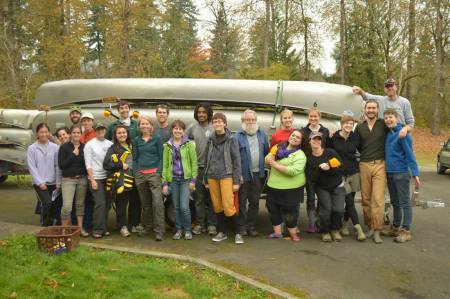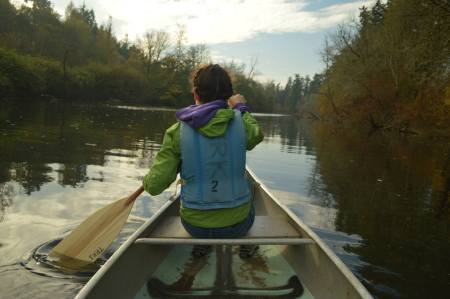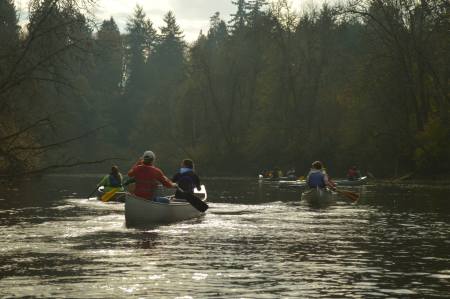A Day On The Tualatin River
rob loucks

On Friday, November 1st, Confluence AmeriCorps members and staff were treated to a warm, autumn afternoon on the Tualatin River for a time of canoeing and plant and animal identification. We were hosted by the Tualatin Riverkeepers, a non-profit working to restore the Tualatin River system. Their work in advocacy and restoration related to a lot of the work and experiences of Confluence AmeriCorps members, as well as their work in creating positive river access by building more put-in points along the river and providing educational camps and paddle trips for the public.
The Tualatin Riverkeepers (TRK) generously provided canoes for our paddle trip, and welcomed us enthusiastically into their headquarters to give an informative introduction to TRK’s work and the health of the river. Confluence AmeriCorps members were interested to hear about the history of the river’s health and how stream movement and speed can affect the levels of pollution in the river.
The morning of the canoe trip, we engaged in presentations about the native and non-native flora and fauna we could see on our trip, learning about red dogwood osier, Indian plum, beaver activity, and the fascinating adaptive relationship between yellow-bellied newts and garter snakes! Some members explained later that they made a better connection to the river and the environment because of this new knowledge.

With a mixture of expert canoes, confident paddlers, and first-timers, we took off from the 99W bridge and headed upstream towards the nearby Tualatin River National Wildlife Refuge. We hoped to use our identification knowledge and spot green herons, turtles, and some of the native marmots resting on the bank. We saw the slides of beaver and otter in the mud, a wasp nest hanging over the river, and heard the call of a red-tailed hawk and kingfishers. But the river and bank were otherwise quiet and still.
Against the mellow current of the river, we meandered with our canoe partners, chatting and communicating about our paddling techniques. We were accompanied by representatives and volunteers for TRK who, as one AmeriCorps member noted, showed an obvious love and energy for the river that made the trip even more enjoyable.
We hardly knew when we passed into the Refuge, which was surprising because we had expected to hear the call of migrating birds in the wetlands. However, we were interested to see a petroleum pipeline crossing the river so close to the Refuge! It called forward conversations about river usage by industry, citizens, agriculture, and native creatures in the area. As well as the polluted history of the river.
Overall, we had a thoroughly enjoyable experience exploring the mellow Tualatin River and were wonderfully hosted by the Tualatin Riverkeepers on our journey.
